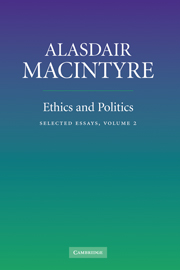Book contents
- Frontmatter
- Contents
- Preface
- Acknowledgments
- PART I LEARNING FROM ARISTOTLE AND AQUINAS
- 1 Rival Aristotles: Aristotle against some Renaissance Aristotelians
- 2 Rival Aristotles: Aristotle against some modern Aristotelians
- 3 Natural law as subversive: the case of Aquinas
- 4 Aquinas and the extent of moral disagreement
- PART II ETHICS
- PART III THE POLITICS OF ETHICS
- Index
2 - Rival Aristotles: Aristotle against some modern Aristotelians
Published online by Cambridge University Press: 27 January 2010
- Frontmatter
- Contents
- Preface
- Acknowledgments
- PART I LEARNING FROM ARISTOTLE AND AQUINAS
- 1 Rival Aristotles: Aristotle against some Renaissance Aristotelians
- 2 Rival Aristotles: Aristotle against some modern Aristotelians
- 3 Natural law as subversive: the case of Aquinas
- 4 Aquinas and the extent of moral disagreement
- PART II ETHICS
- PART III THE POLITICS OF ETHICS
- Index
Summary
Aristotelian moral philosophers of the Renaissance generally had no doubt that what directed right action was a knowledge of the ultimate end of human beings. Knowledge of that end provides us with one set of premises for our practical reasoning, knowledge of this or that particular agent's particular circumstances another. Conjoin those sets of premises and from them the agent will by sound inferences be able to reach a true conclusion about what is to be done. Those philosophers thus affirmed versions of what Sarah Broadie has denounced as “the ‘Grand End’ view of practical wisdom.” The virtuous agent on this view (Broadie ascribes it to John Cooper, Anthony Kenny, and myself: I am not sure that she is quite right about any one of us, but she would certainly have been right in ascribing it to Leonardo Bruni or Francesco Piccolomini or John Case) begins from what Broadie calls a “grand picture” of “the human good without restriction,” a vision “invested with a content different from what would be aimed at by morally inferior natures.” “A choice shows practical wisdom only if … given the facts as seen by the agent, enacting the choice would lead to the realization of his grand picture” and “his grand picture is a true or acceptable account of the good.”
Broadie is not claiming that those who hold the Grand End view believe that rational agents on all occasions explicitly argue from premises about the Grand End to immediate practical conclusions.
- Type
- Chapter
- Information
- Ethics and PoliticsSelected Essays, pp. 22 - 40Publisher: Cambridge University PressPrint publication year: 2006
- 10
- Cited by



